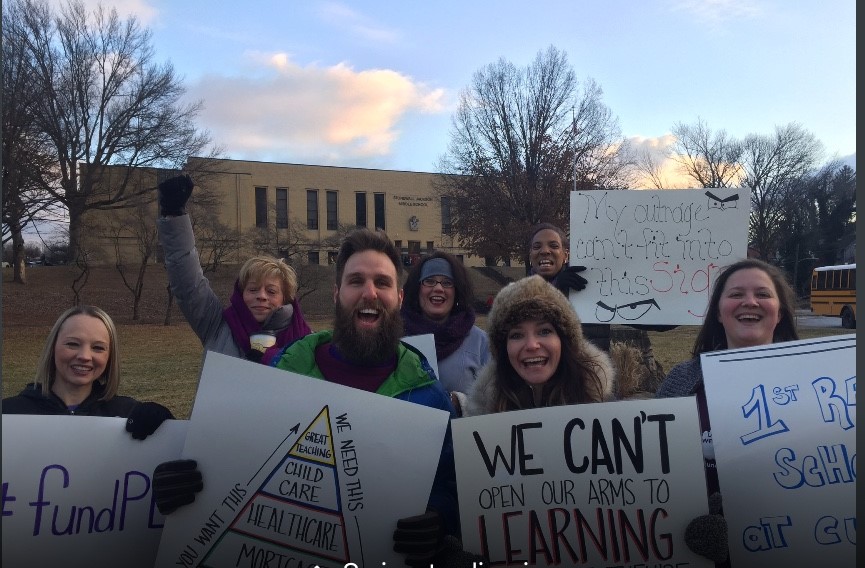
West Virginia teachers' strike in 2018. Photo: Lida Shepherd/AFSC
This article originally appeared in the Charleston Gazette-Mail.
It’s been over five years since the historic teachers strike in West Virginia. To this day, it’s one of my proudest moments as a West Virginian. Teachers, cooks, bus drivers, students and parents like me filled the state House of Delegates and Senate galleries, the upper and lower rotundas and spilled out into the hallways of the state capitol. The frustration, and also the joy of being together in the fight for working people, were palpable.
Of course, union organizing in West Virginia is nearly as old and storied as our mountains, but the 2018 teachers strike was the first time I got to witness its power first-hand.
Today, even though we’re a few states away from the action, the strike of the United Auto Workers in Michigan is pretty darn exciting. Of course, another reason West Virginians can feel close to the UAW strike is that our own Walter Reuther, a native of Wheeling, was the longest-serving president of the UAW. Reuther, having survived two attempted assassinations, served as UAW president until he died in a plane crash in 1970.
During his time as UAW President, Reuther used (with a lot of success) a strategy called “pattern bargaining” against what were “the big three” auto companies – then General Motors, Ford Motor Company and Chrysler. Pattern bargaining was essentially a tactic to leverage the competition amongst the big three in order to advance the wages or improve the working conditions of all autoworkers.
Martin Luther King Jr., on the 25th anniversary of the UAW’s founding, wrote in a letter to Reuther, “Through trials, efforts and your unswerving devotion to humanitarian causes, you have made life more meaningful for millions of working people. Through moments of difficulty and strong obstacles, you have stood firm for what you believe, knowing that in the long run ‘Truth crushed to earth will rise again.’ As I have heard you say, the true measure of a man is where he stands in moments of challenge and controversy.”
The UAW is in a great moment of challenge because up until now, the union has never carried out a simultaneous work stoppage at “the big three” auto companies – now General Motors, Ford and Stellantis.
As with any historic moment, there is always important context. During the great recession around 2007 through 2009, the auto industry got a bailout of billions of dollars from the federal government, and at the same time autoworkers took massive cuts to their wages and benefits. Pensions all but disappeared. The companies introduced “tiers” which basically meant worse pay for the same work.
Since then, the labor of the autoworkers has generated $250,000,000,000 – yes that many zeroes — a quarter of a trillion dollars for the shareholders of the three companies. CEO pay is up 40% while autoworker wages went up 6%. Try to square that 6% with inflation having gone up 18%.
Now with major federal investments in a shift toward electric vehicles, the companies are forming “joint venture” battery plants, while closing profitable ones in Ohio, Illinois and Michigan. All of these maneuvers are “profit above all” attempts to pay lower wages and weaken worker safety standards at battery plants.
So, there’s a lot on the line, and what happens in Michigan will set the stage for whether electric vehicle manufacturing will be gateway to the middle class for hundreds of thousands of families, or deepen the already gaping chasm between the CEO class and the working class of this country.
The striking autoworkers are asking for fair pay, equal pay for equal work, and ensuring that EV jobs pay a good wage and are safe for workers. What’s not to like about that?
In the same letter King wrote to Reuther, he said something that hits home today. It’s a sentiment I hope we can echo to both the teachers and school employees who went on strike in 2018, and to the autoworkers in Michigan who are on strike today: “One day all of America will be proud of your achievements, and will record your work as one of the glowing epics of our heritage.”